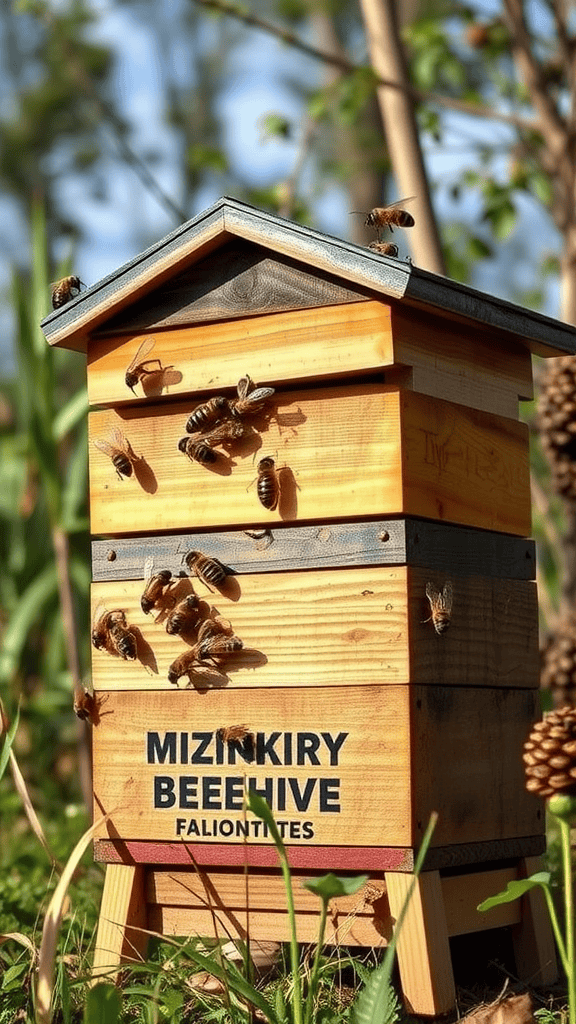Steps to Start a Beehive at Home: Essential Tips for Beginners
Starting a beehive at home is a rewarding and educational experience that connects you with nature while producing delicious honey. If you are new to beekeeping, follow these essential steps to get started on this sweet journey.
Understand Beekeeping Basics
Before diving into beekeeping, it’s crucial to understand the basics. Beekeeping involves maintaining bee colonies in hives, where bees live, work, and produce honey. It requires dedication and a willingness to learn. Research online resources, attend local beekeeping classes, or join a beekeeping association to gather knowledge.
Choose the Right Location
The location of your beehive is essential for the health and productivity of your bees. Consider the following factors when choosing a spot:
- Sunlight: Place the hive in a sunny area, preferably where it gets morning sunshine to help bees warm up.
- Accessibility: Ensure easy access for maintenance and honey harvesting.
- Water Source: Bees need water for hydration and to dilute honey. A nearby water source is helpful.
- Avoiding Obstructions: Avoid placing the hive near heavy traffic areas or under strong winds.
Select Beekeeping Equipment
Investing in the right equipment is crucial for successful beekeeping. You will need:
- Beehive: There are various hive types, but the Langstroth hive is popular among beginners. It’s easy to manage and allows bees to build their comb in removable frames.
- Protective Gear: Wear a beekeeping suit, gloves, and a veil to protect yourself from stings.
- Smoker: This tool calms bees and helps you work more safely around them.
- Hive Tool: Essential for lifting frames and scraping wax.
- Bee Brush: Handy for gently moving bees off frames during inspections.
Acquire Your Bees
After setting up your equipment, it’s time to acquire your bees. There are three main options:
- Package Bees: These are bees sold in a box with a queen. It’s a common choice for beginners.
- Nucleus Colony (Nuc): A small, established colony that comes with frames of bees, brood, and a queen.
- Swarm: Capturing a swarm can be an option, but it may require more experience.
Install Your Bees
Once you have your bees, it’s time to install them into your hive. Follow these steps carefully:
- Open the hive and remove a frame to create space for your bees.
- Gently shake the package of bees to transfer them into the hive. If you are using a Nuc, simply place the frames into your hive.
- Introduce the queen to the hive. If using a package, release her from her cage after a few days.
- Close the hive and leave the bees to settle in.
Regular Hive Inspections
Regular inspections are vital for ensuring your bees are healthy and productive. Check your hive every 7-10 days, especially during the spring and summer months. Pay attention to:
- Queen Health: Look for signs of a laying queen.
- Brood Pattern: A healthy brood pattern indicates good hive health.
- Worker Bees: Ensure there is enough worker bee activity for foraging and hive maintenance.
Harvest Honey Responsibly
Once your hive is established and producing honey, you may want to harvest it. The best time to harvest is late summer or early fall when the honey supers are full. Use the following guidelines:
- Only harvest excess honey; leave enough for the bees to sustain themselves through winter.
- Use a honey extractor to gently remove honey from the comb without damaging it.
- Store honey in a clean, airtight container and label it.
By following these steps, you’ll be well on your way to starting a successful beehive at home. Enjoy the journey of beekeeping and the sweet rewards that come with it!
Benefits of Keeping Bees: Why You Should Consider Beekeeping
Beekeeping is emerging as a popular hobby for many people around the world. If you’ve ever considered the idea of keeping bees, you’re in for a treat. Keeping bees offers numerous benefits that go beyond simply collecting honey. Here are several compelling reasons why you should think about beekeeping.
Boosting Biodiversity
One of the most significant advantages of beekeeping is its positive effect on biodiversity. Bees play a crucial role in pollination, which helps plants reproduce and thrive. By keeping bees, you are contributing to the pollination of local flowers, fruits, and vegetables. This not only supports your ecosystem but also enhances food production.
Fresh Honey and Bee Products
When you start your own beehive, you gain access to fresh honey right from your backyard. Home-harvested honey is often superior in quality and taste compared to store-bought varieties. Additionally, bee products like beeswax, propolis, and royal jelly have their own health benefits. You can use beeswax for candles, skincare products, and even as a food wrap.
Personal Satisfaction and Connection to Nature
Beekeeping fosters a unique connection between you and nature. Watching bees work in harmony gives a sense of satisfaction and joy that is hard to replicate. The experience of nurturing a hive can be both rewarding and fulfilling, allowing you to observe the fascinating social structure of bees up close. You’ll develop a deeper appreciation for the natural world.
Environmental Contribution
In recent years, bee populations have been declining due to habitat loss, pesticide use, and climate change. By starting your own beehive, you can take action to help sustain these important pollinators. Every beehive contributes to the population of bees in your area and can help combat the detrimental effects of these challenges. Your efforts will actively support ecological health.
Learning and Skill Development
Beekeeping is not just about honey; it’s also about learning. As you care for your bees, you will acquire new skills and knowledge related to biology, ecology, and agriculture. This hands-on experience will enable you to better understand the critical role bees play in our food systems. Moreover, it opens opportunities for continuous learning as you dive deeper into the intricacies of bee behavior and hive management.
Health Benefits
Engaging in beekeeping offers several health benefits. Spending time outdoors reduces stress, and observing the busy life of bees can have a calming effect on your mind. Additionally, consuming raw honey is associated with various health advantages—it can help soothe allergies, combat illness, and even support digestive health. If you have allergy issues, local honey may offer some relief by helping your body acclimate to local pollen.
Community and Networking
Joining the beekeeping community is another fantastic perk. Beekeepers often find a sense of camaraderie with fellow hive enthusiasts. Engaging with local beekeeping clubs or organizations provides opportunities for networking, sharing knowledge, and exchanging ideas. Being part of this community allows you to connect with like-minded individuals who share your passion for bees.
A Sustainable Hobby
Beekeeping is considered one of the most sustainable hobbies you can undertake. Unlike many other hobbies, it does not rely on non-renewable resources. Instead, it promotes sustainability through pollination and the production of natural products. By minimizing your carbon footprint, you contribute positively to the environment. Plus, it’s a rewarding way to produce your own food.
Economic Opportunity
Beekeeping can also provide an economic advantage. If managed well, a thriving beehive can generate income through honey sales and other bee-related products. Many local farmers’ markets welcome home-harvested honey, which can turn this hobby into a profitable venture. As awareness of the health benefits of honey rises, so does the demand for local honey, which can be a lucrative opportunity for backyard beekeepers.
The benefits of keeping bees far outweigh the challenges involved. From boosting biodiversity and producing delicious honey to developing new skills and connecting with nature, there are countless reasons to consider starting your own beehive. You not only contribute to the well-being of your local environment but also enrich your own life in numerous ways. So why not take the plunge into the fascinating world of beekeeping today?
Conclusion
Starting a beehive at home is an exciting journey filled with rewards that extend far beyond honey production. By following the essential steps, such as researching local regulations, choosing the right beehive design, and selecting bee species, you can create a thriving environment for these remarkable creatures. Remember to be patient and observant as you learn the intricacies of beekeeping; every beekeeper starts as a beginner, and each season will teach you something new about your buzzing companions.
Keeping bees offers numerous benefits that make it a fulfilling hobby. Aside from enjoying fresh honey, beekeeping plays a crucial role in supporting biodiversity and improving pollination in your garden, leading to healthier plants and more vibrant blooms. Furthermore, engaging in beekeeping can foster a deeper connection with nature and serve as a stress-relief outlet, allowing you to unwind as you care for your hive.
As you embark on this adventure, it’s essential to embrace the learning process. Surround yourself with fellow beekeepers and absorb their wisdom to enhance your understanding. Take pride in the sustainable practices you cultivate, knowing that you are contributing positively to the environment. Whether you are driven by the desire for local honey, the experience of nurturing a colony, or the ecological impact of your efforts, beekeeping at home can be a profound and enriching endeavor. So, gather your supplies, dive into the world of bees, and let this buzzing community bring new joy to your life.
As an Amazon Associate, I earn from qualifying purchases.

